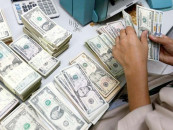SBP restricts outflow of dollars
Central bank discouraging imports to avert further drop in forex reserves

Amid declining foreign exchange reserves, the State Bank of Pakistan (SBP) has started choking the outflow of dollars of small amounts of less than $100,000 to avoid a further dip in the reserves, exposing many factories to the risk of closure and monetary penalties. The restrictive measures by the central bank are part of various capital controls that Pakistan is applying to avert a default-like situation amid a delay in approval and disbursement of $1.12 billion loan tranche by the International Monetary Fund (IMF), according to the sources.
The federal government also did not lift a two-month ban on imports on Monday, indicating the gravity of the situation. The SBP is discouraging imports being made through the Letters of Credit (LCs) and against open accounts like Cash Against Document (CAD) import schemes, according to the industry people. In the CAD scheme, the exporter presents an invoice and dispatches documents through its bank to the importer’s bank. The importer’s bank delivers the documents to the importer only after payment to the exporter through the remitting bank.
But the SBP has now linked the release of these documents with its permission, delaying import clearance to save dollars. Many industries are now facing shortage of raw material and are on the verge of cutting their production. Factories importing raw material for producing food, medicines and iron are now facing serious supply constraints. “We imported raw material from Dubai in order to ensure smooth functioning of our operations but due to non-release of our import documents and consequent non-availability of raw material, the mill is on the verge of closure,” said Ibrahim Tariq Shafi, Executive Director of Ittefaq Iron Industries Limited.
Shafi said that his company has so far paid Rs7.5 million in demurrage charges to the port authorities due to delay in clearance of their imports that are stuck at the port because of the central bank. According to the Pakistan Bureau of Statistics, the Largescale Manufacturing Index (LSMI) output contracted 1.3% in May when compared with April, indicating that industries have started feeling the heat of contractionary measures. Overall, the LSM increased 11.7% during July-May 2021-22 when compared with the same period of last year, according to the PBS. Details showed that the central bank was not giving permission to clear the import documents even in cases where the amount was as small as $33,571.
About 15 consignments of the Ittefaq mill having total value of just $2 million were pending at the ports as of July 5. Out of this, the central bank gave permission for only four consignments, including two that were cleared this week. No foreign supplier will agree to do business with us or others under the cash against document, which will very badly impact and lead to closure of all imports-based industries importing raw material under this scheme instead of letter of credit, according to Ibrahim. The company imports scrap and ferros for the manufacturing of the steel. The local banks have been informing their clients that even small amounts like less than $100,000 cannot be cleared in bulk in individual categories. One company can get only one document of less than $100,000 a day, according to the SBP’s instructions to the bank.
“We had hoped that all restrictions on imports would be eased after the announcement of the staff level agreement with the IMF but it now seems that the restrictions will remain in place at least till the end of August,” a person who is directly involved in the decision making told The Express Tribune. The IMF is going on recess from next month and during this time Pakistan will be required to implement all the prior actions that will take time. It seems that the government also does not have many options but to wait for the IMF the tranche.
And the IMF was waiting for the notification of increase in electricity prices and more importantly whether the government can arrange $4 billion to bridge the financing gap against $35.1 billion needs for this fiscal year. Without seeking assurance of $4 billion additional funding, the IMF will not take Pakistan’s case to its board for approval. Markets have again panicked after the PML-Ns’ defeat in Punjab and the rupee suffered its singleday highest loss in almost two and half years. The rupee closed at Rs215.20 to a dollar in the interbank on Monday – the loss of Rs4.25 to a dollar in just one day. As of July 7th, Pakistan’s gross official foreign exchange reserves remained at just $9.7 billion – hardly sufficient for seven weeks of imports at their current level.
This is despite the fact that the central bank is also not allowing free repatriation of dividends. The federal government had also imposed a ban on imports of roughly 41 dozen goods in addition to imposing quota restrictions on other items like cars and mobile phones parts. The federal government has not yet lifted a ban on import of these goods, which was placed exactly two months ago. A Commerce Ministry official said that the government was reviewing the impact of the ban on imports and a summary will soon be tabled before the federal cabinet for a decision.


















COMMENTS
Comments are moderated and generally will be posted if they are on-topic and not abusive.
For more information, please see our Comments FAQ